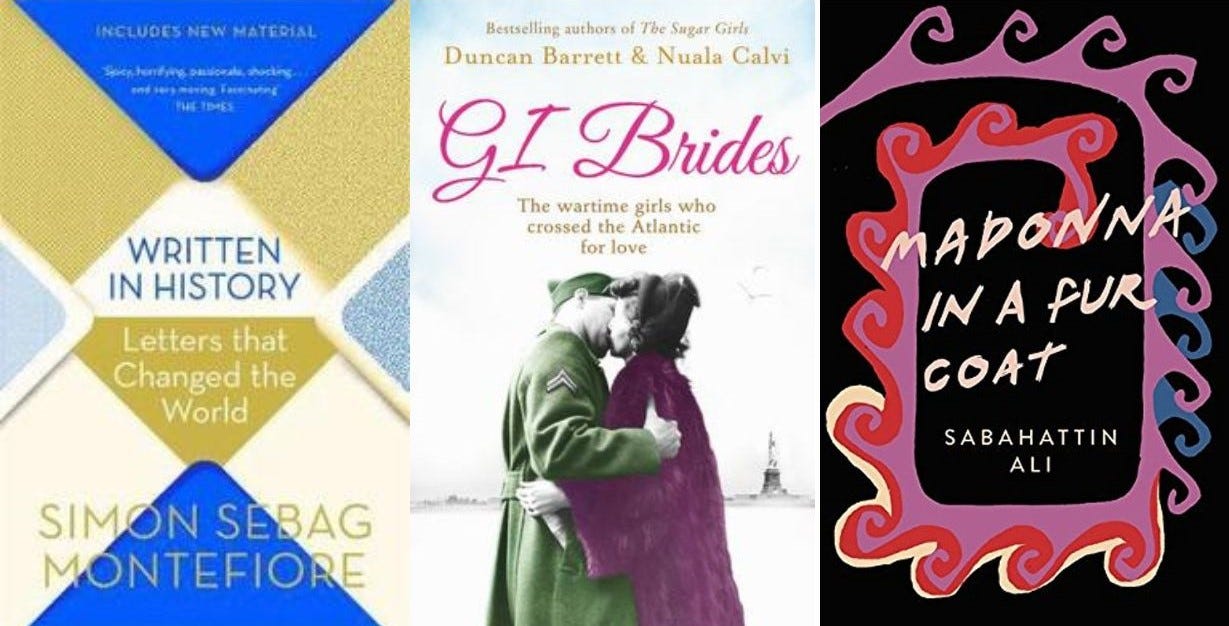It all ends here

It all ends here
I've always been fascinated by the first lines of novels. In fact, when I was younger, I used to collect my favourites in a notebook – something I have started doing again recently.
I've also started looking more at last lines, specifically chapter endings and how they can encourage you to keep on reading, no matter what you should otherwise be doing – sleep, work, life in general...
I can remember being about 15 years old, hiding under covers in the early hours of the morning, reading the end of Jilly Cooper's Polo with a torch.
Every one of those last chapters ended in a way that wouldn't allow me to put the book down. Yes, I was willing to take the risk of doing badly in my GCSE mocks that week due to lack of sleep if I meant I learned what happened to Perdita MacLeod and, most of all, to Ricky France-Lynch.
There are so many ways to end a chapter, but among the best are a cliffhanger, or a confession by a character, a mistake being realised, an opportunity for change, or some kind of decision needing to be made.
Here is the closing line from the first chapter of The Marriage Portrait by Maggie O'Farrell:
She sets down her cup; she lifts her chin; she turns her eyes on to her husband, Alfonso, Duke of Ferrara, and wonders what will happen next.
As do we as readers; we want to know what is next for Lucrezia, who has just had the realisation that Alfonso is planning to kill her. A concise way to close the chapter and leave the reader wanting more.
And here is a chapter ending from late on in Elizabeth Kostova's The Historian:
Then we reached under the edge of the gravestone and lifted. The stone slid halfway off, a marvelous construction. We were both shaking visibly, so that the stone all but slipped out of our grasp. When it was off we looked down at the body inside, the heavily closed lids, the sallow skin, the unnaturally red lips, the shallow, soundless breathing. It was Professor Rossi.
You don't need to have read the rest of the book to understand that it was not Professor Rossi they had expected to find inside. And that neat little four-word sentence at the end there – coming after the longer description of the body before it – makes the surprise end to this chapter clear without you having read anything else of the book.
I enjoy the hint of ominous foreboding that F. Scott Fitzgerald has woven into this chapter ending from Tender is the Night:
Dick and Rosemary had luncheon at the Castelli dei Caesari, a splendid in a high-terraced villa overlooking the ruined forum of an undetermined period of the decadence. Rosemary took a cocktail and a little wine, and Dick took enough so that his feeling of dissatisfaction left him. Afterward, they drove back to the hotel, all flushed and happy, in a sense of exalted quiet. She wanted to be taken and she was, and what had begun as a childish infatuation on a beach was accomplished at last.
I'm left with questions: how does Rosemary react after this and what does she do next? Is this culmination of what she wanted truly satisfying to her? Without saying it, Fitzgerald manages to imply – in spite of them being "all flushed and happy" – that there won't be a pleasant denouement.
And look away now if you don't like spoilers, because this one, from A Town Like Alice by Nevil Shute, is one great big reveal:
Hussein broke in. "The one who was beaten was an Australian, not English. He was beaten because he stole chickens."
"Assuredly," the old man said. "It was for stealing the black chickens. But did he live or die?"
Yacob called up from the bottom of the well. "Captain Sugamo had him taken down that night; they pulled the nails out of his hands. He lived."
This comes about a third of the way into the story and, until that point, both the heroine, Jean Paget, and the reader have believed that her friend Joe Harman died some years earlier. Jean has returned to the Malaysian village where she spent time during the war to build a well for the people of the village and learns from them, right at the end of the chapter here, that Joe Harman survived. We are left with the big question of what Jean will do with this new information she has learned.
I read somewhere that chapter endings should be beginnings – the beginning of what is going to happen next or later in the story. An incredibly useful piece of advice, and perhaps the crux of why you cannot put down some books.
And in all these examples, the chapter endings offer beginnings and reasons to read on. What happens next to Lucrezia? Why was Professor Rossi's body in the grave (and why does he still seem to be breathing)? Will Rosemary be satisfied with what has happened? Will Jean Paget find Joe Harman?
What pleases me most of all, though, is when a chapter opens with a bang and also provides a matching and enticing ending.
Here's the opening and ending of the prologue in Kate Quinn's The Huntress (I really did try not to take examples from too many books set during the Second World War.)
OPENING:
She was not used to being hunted.
ENDING:
Run.
Hide.
Or die.
[chef's kiss]
If first lines interest you more than endings, why not follow Rebecca Heyman's #Firstlinefrenzy posts on Instagram, where she teaches how to create winning opening lines by dissecting and critiquing submitted first lines from writers.

What I've been up to recently
And talking of endings... Me tying up the end of the novel is drawing closer. Thanks to two large projects with clients being wrapped up in early March, I've had more time for writing, and I am hoping to have the last scenes completed by mid-April. But you know what Douglas Adams said about deadlines...
I'm now at that stage where whatever I write in the last part of the novel has an impact on earlier scenes. And then, as soon I go back to make the necessary changes, I get trapped in editing mode and start tweaking those earlier scenes and trying to finesse them. It's the ongoing battle between my writer-brain and my editor-brain.
I am inching, inching, inching towards the finish line, though.
Photo by Crawford Jolly
*"I love deadlines. I like the whooshing sound they make as they fly by."
What I've been reading recently
Initially this month, I struggled to finish any of the many different books I had on the go. I am a mood reader, and sometimes that's a blessing and other times (such as when I really should finish a book, any book) it's a curse. And then, from nowhere, I picked up speed and finished off three:
Written in History: Letters that Changed the World – Simon Sebag Montefiore: A fascinating collection of letters that had an impact on the world, from ancient times to just a few years ago. I enjoyed most of the letters in here, although a few I did skip over (and then felt incredibly guilty for doing so).
GI Brides – Nuala Calvi & Duncan Barrett: A narrative non-fiction telling of the stories of four English girls who married GIs and joined them in the US after the war. From time to time, I found it hard to remember which of the girls was which, but it was still an interesting book, especially about the local reactions in the US to the arrival of the GI Brides (about as warm as the British reaction had been to the GIs themselves...).
Madonna in a Fur Coat – Sabahattin Ali: I borrowed this from the library after reading a review of it in author Rebecca Makkai's newsletter. She's currently reading 84 translated books from around the world in honour of her Hungarian translator father who died during the pandemic. Madonna in a Fur Coat was her read from Turkey and it is a gem of a book. It sucks you right in (there are no chapters, just three sections to the book) to the tale of Raif Bey, a seemingly quiet and shy translator whose hidden earlier life in 1920s Berlin is revealed through his notebook. It's a captivating story, beautifully told over a mere 160 or so pages.

What I've been watching recently
I've been watching a few 1940s-set films recently just to get a feel for setting and costume and props and all those other little details that can contribute when writing in the past. Here are a few that I have enjoyed:
Went The Day Well (1942): A film made during the Second World War and set at that time about a small English village that is taken over by a group of German soldiers masquerading as British troops on an exercise. The plot is based on a short story written by novelist Graham Greene in 1918 and, although dated in places, is quite an interesting glimpse into people's thoughts at the time about fifth columnists and potential invasion.
Mission of Honor [Hurricane] (2018): The story of the RAF's 303 Squadron, a group of Polish (and some Czech) pilots who flew during the Second World War. The film is decent, but I did enjoy that a lot of the dialogue was in Polish and subtitled. I have no idea if the non-Polish-speaking actors were any good with their accents, but I felt it added a little more to the feel of the story. It also led me to read up a little more on Jan Zumbach, the lead character in the film - and boy, did he have an interesting life.
Jojo Rabbit (2019): In my ongoing quest to convert the boys to like films set during the Second World War, I put this on Jojo Rabbit – the story of a ten-year-old boy whose imaginary friend is Adolf Hitler – one evening. It proved an enormous hit with both of them. For me, it was not just funny but also informative, and I spent much of it taking mental notes of costumes and interiors. And not only did they both laugh throughout, but it also sparked some interesting questions from them.
Until the next time,
Was this newsletter forwarded to you? Click to subscribe.
If you like this newsletter, you can buy me a virtual coffee - coffee always keeps me going ☕
If you’d like to get in touch, please do ping me an email.




